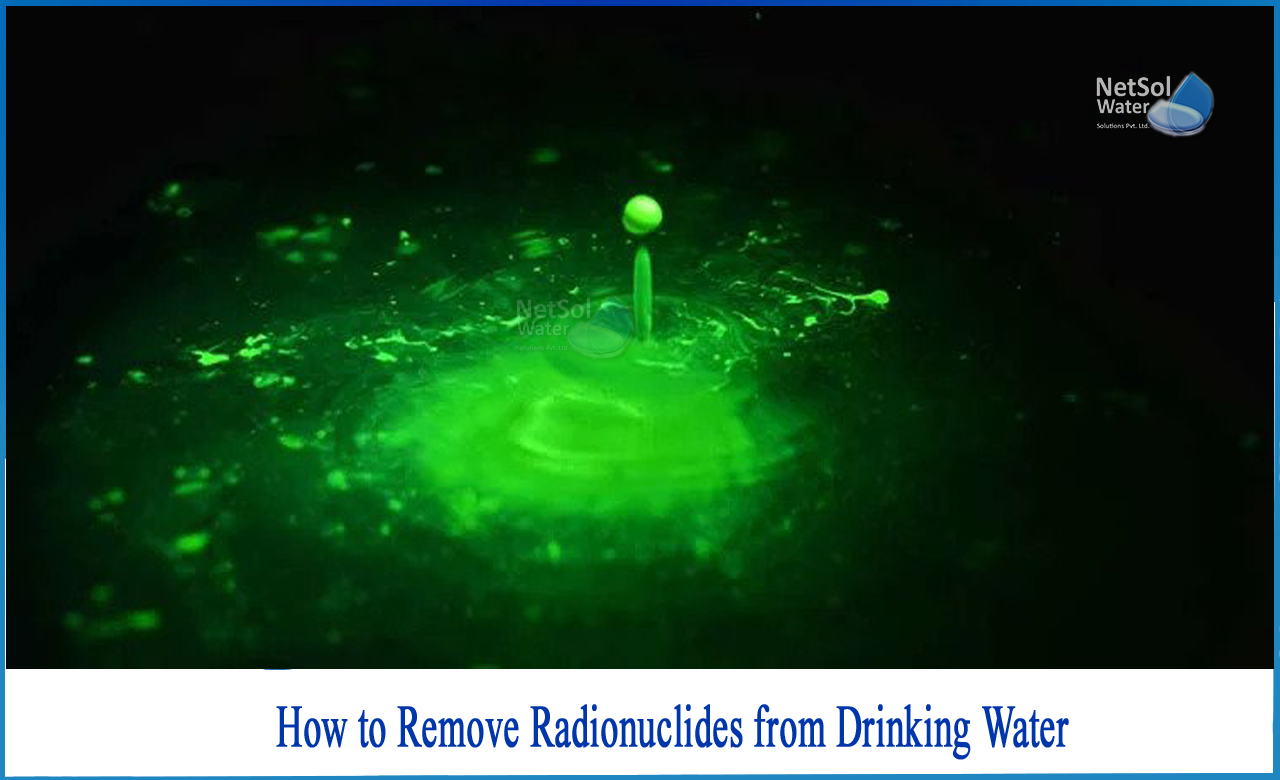How to remove radionuclides from Drinking Water?
As it decays and becomes more stable, a radionuclide is a chemical element in an unstable form that emits radiation. The most common radionuclides discovered in drinking water are radium, radon, and uranium.
The bulk of radionuclides in drinking water occur naturally at extremely low levels, posing no concern to human health. Radionuclides can be released into drinking water as a result of human activities such as operating nuclear power plants or other facilities that create or consume radioactive substances.
Groundwater Radionuclide Treatment
1: Blending:Blending is a non-treatment strategy that involves diluting radionuclide-containing waters with non-radionuclide-containing water sources. Waters from all sources should be completely mixed before being released to downstream customers at facilities that use this procedure. To ensure safety, the ratio of contaminated waters to non-contaminated or low-contaminated waters should be set so that contaminant levels are far below the MCLs.
2: Exchange of ions: By running water through cation (positively) or anion (negatively) charged resin media that binds the contaminants, radionuclide treatment can remove up to 99 percent of the beta, alpha, radium, and uranium contamination that are suspended in water. Sodium and potassium are commonly used in exchange resins for Ra 226 and Ra 228, which also remove hardness components including iron, calcium, magnesium, and manganese.
As a result, this strategy may appear interesting to establishments that must deal with both water hardness and radioactive pollution. Several variables can limit the efficiency of ion exchange as a best-available technology (BAT) and Small System Compliance Technology (SSCT) for radioactive treatment. Furthermore, high magnesium and iron levels in source streams might clog resin medium.
3: Lime liquefaction: Lime softening is a BAT and SSCT method for removing radium from source waters. Between 50 and 80 percent of Ra 226 and Ra 228 can be removed by lime softening. In the same process step that eliminates radium and uranium, lime softening equipment can also remove iron, manganese, and magnesium.
4: Reverse osmosis (RO):Total dissolved solids (TDS), chlorides, and hardness are all removed from water using reverse osmosis (RO) technology, which employs semi-permeable membranes. The main premise of RO is to use high pressure to overcome natural osmotic pressure in order to force water from a highly concentrated feed solution into a pure water permeate.
During this procedure, any dissolved contaminants are eliminated. Because suspended particulates, metal oxides, and colloidal deposits can foul reverse osmosis membranes, pre-treatment, such as ultrafiltration, is frequently used for water sources containing these elements.
5: Distillation: Distillation is a method for eliminating all common forms of radionuclides from drinking water except radon. Water is heated to boiling in an enclosed container during the distillation process. The contaminants in the water evaporate and are left behind in the container. The steam cools and condenses back into a liquid as it passes over coils that supply the cooler untreated water to the unit.
6: Aeration: Aeration is one of the methods for eliminating radon. Before the water reaches your tap, up to 99.9% of the radon can be eliminated by exposing it to adequate air. The National Sanitation Foundation and the Water Quality Association have not evaluated or certified aeration systems. However, three major types of home aeration systems can eliminate radon: spray aeration, packed column, and a shallow tray unit.
7: Granular Activated Carbon: GAC systems eliminate radon from water through adsorption, which means that when water passes through the carbon material in the unit, radon gathers on the material's surface and is removed from the water. The efficiency of the adsorption process is determined by a variety of elements, including the pH and temperature of the water, the chemical composition and concentration of the pollutants, and the system's water flow rate and carbon exposure time. The rate of adsorption normally rises when the temperature and pH levels decline.
Conclusion
Radionuclides in drinking water cause cancer and a variety of other health problems, including kidney impairment and birth defects. As a result, removing radionuclides from the water is critical.
Netsol delivers the greatest water treatments in India, including RO, distillation, aeration, and others, to remove radionuclides from the water. Netsol Water offers RO systems that may be customised to fulfil a range of specific needs, including radium removal. Pre- and post-radium removal equipment is integrated into these systems.
Netsol Water is Greater Noida-based leading water & wastewater treatment plant manufacturer. We are industry's most demanding company based on client review and work quality. We are known as best commercial RO plant manufacturers, industrial RO plant manufacturer, sewage treatment plant manufacturer, Water Softener Plant Manufacturers and effluent treatment plant manufacturers. Apart from this 24x7 customer support is our USP. Call on +91-9650608473, or write us at enquiry@netsolwater.com for any support, inquiry or product-purchase related query.



